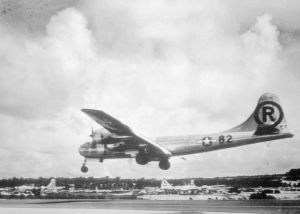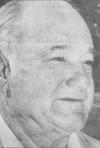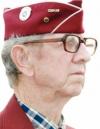The day the bomb fell
By Kenneth Fine
Published in News on August 6, 2013 1:46 PM

Submitted photo
The bomb dropped on Hiroshima Aug. 6, 1945, fell from the Enola Gay, seen above. Wayne County resident and former World War II prisoner of war Hugh Howard was friends with Tom Ferebee, the bombardier who helped the aircraft's crew make history.

Tom Ferebee

Hugh Howard
A man pulls his car off a country road and breaks down.
He still can't believe the news that has just been delivered over his radio -- that a U.S. aircraft had, moments earlier, dropped a bomb on Hiroshima; that thousands of Japanese were dead; that the man who had sent it to the earth was a farmer he had known since he was a boy.
It has been 68 years since Hugh Howard experienced an emotion that has gone unmatched ever since.
But nearly seven decades later, the 89-year-old still chokes up when he recalls hearing the name Tom Ferebee during a simple drive he had taken dozens of times over.
It was Aug. 6, 1945.
"They said something like, 'A man from North Carolina, Tom Ferebee from Mocksville School, has dropped a bomb on Hiroshima, Japan, and it has killed thousands,'" Howard said, his voice breaking. "I pulled off that road and cried. It hit me just like a ball bat that somebody that I knew from my hometown ... had done this."
*
Less than a year earlier, Howard wasn't sure if he would ever see Davie County again.
A bombing raid gone bad had landed him in a German prison camp.
"I got shot down over Cologne on my 19th mission. I was flight engineer and top gunner," Howard said. "Two days later, I turned 21 in prison."
His B-17 hit by enemy fire, the young man parachuted to the ground.
"You can't describe it. It was something else," he said. "It just seemed like a dream."
But when, some 15 minutes after he landed in between a factory and a strip of houses, he was captured, the reality of his circumstance set in.
"They spent about 30 minutes driving me around Cologne showing me the damage," he said. "Every time (the German officer sitting next to me) noticed something he wanted me to see, he jabbed me in the ribs with his gun."
Two days of interrogation would follow.
And when the Germans realized Howard wasn't breaking, they sent him to Stalag Luft IV, "way up on the Baltic," where he remained for two months.
"Then, one morning, we heard, 'Boom. Boom. Boom,'" he said. "It rattled all the windows in the building. The Germans got all excited because it was the Russians."
The knew they would have to evacuate the camp with the thousands of prisoners housed there in tow.
So the next night, via train, they did.
That train ride -- which ended in Nuremberg -- took 11 days, Howard said.
"At one point, we sat there for three days and nights with no movement, no food and no water," he said. "They could only travel at night because fighters, our fighters, would strafe them."
But the conditions, Howard said, would only get worse.
"(The camp at Nuremberg) was the most lousy thing you have ever seen," he said. "There were fleas and they would get all over you. You would have to squeeze them and it would leave a blood spot."
And when, one morning, the prisoners heard, "Boom. Boom. Boom," again, Howard faced the most trying time he experienced as a POW -- the three-week march to Munich.
"By that time, we had gotten little food parcels and things, but the Germans, before they would give them to us, would open them," he said. "So by the time we got a can of beans, sometimes, it had already turned green. We hardly had anything to eat."
So when the siren sounded inside Stalag VII-A on April 29, 1945, Howard couldn't believe he was, at last, free.
"We didn't know what was going on, so every once in a while, someone would pop their head out and look. The next thing we knew, the whole environment began to move -- U.S. Army tanks were coming," he said. "The screaming going on, you had never heard anything like it in your life. You can't describe it. It was something else."
*
Howard chokes up again when he talks about a conversation he had with one of the men who helped end the war that has, in many ways, defined his own life ever since.
"Tom said, 'A lot of people always ask me, but I don't look back on it with regret. I feel like I caused the end of the war to happen,'" Howard said. "It was heart-touching. Something you just couldn't imagine."
So as the world, today, marks the 68th anniversary of the bombing of Hiroshima, an 89-year-old Wayne County resident will honor the "old farm boy" who will forever be remembered as a bombardier aboard the Enola Gay -- the man he grew up with who, years later, helped a former POW gain a little bit of closure.
"I just felt like he needed to be recognized on his day," Howard said. "I know I'll never forget."
